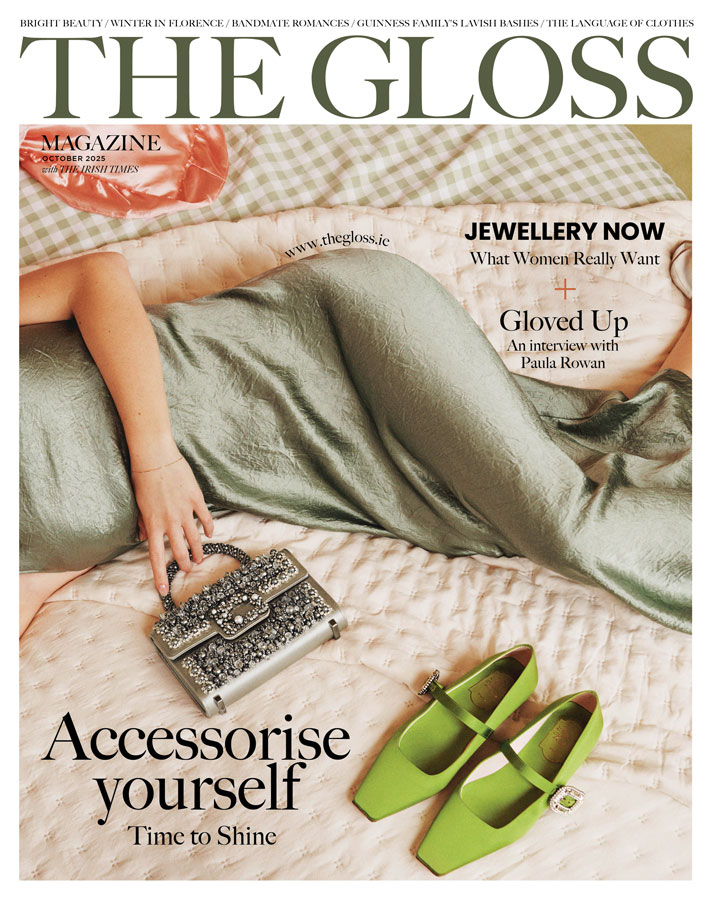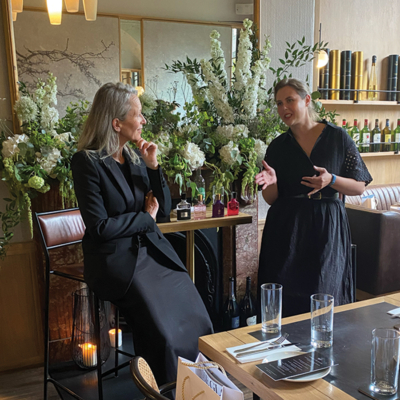Why are just seven per cent of Irish CEOs women? Why do people equate “part-time” with “part-committed”? And why are some women BETTER AT MAKING MONEY than others? POLLY DEVLIN, a thwarted property developer and failed television tycoon, talks women in business …
Do you hate your work? Does it squat on your life? Do you wish you could walk away from it and, if you could, do you know what you want to do? If you are doing something that relates to your heart and soul, something which gives you companionship and contact with others and which, in other words, is creative, you are lucky or clever or both and you are probably as happy as can be. Which is never totally happy. Such totality is beyond us thank goodness. There may be ways of making daily drudgery creative but I’m blowed if I know how. It used to be that we were told to offer up to God the things that made us unhappy, so that you were banking credit for a heavenly future but, like most banking lore, that panacea has gone. Philip Larkin called work “the toad”. Why should I let the toad work / Squat on my life? / Can’t I use my wit as a pitchfork / And drive the brute off? Good question, our Phil, and indeed for most of my life I have used my wits rather than my wit to drive the brute off. (Surely your wit too, I hear you cry?)
I don’t have a head for business – I panic too easily for a start – and I have no appetite for work in the conventional sense, although I work hard to avoid the work I should be doing (writing) and I manage to avoid making a business out of something I do quite well (buying houses). Any mild success I have had in that line seems arbitrary and inadvertent and I never pursue it to its profitable end. I think many women think in the same way and shy away from running a business because of familial, gender, religious, colonialist but, most of all, cultural reasons.
Briefly, the culture and colonised background in which we grew up in Ireland gave us little concept of the making of money. If educated women worked at all they were teachers or nurses; young women who left school at 14 made bras in a factory ten miles away (owned by Protestants) until they got married. The other factors? Religion? Don’t get me started. Every priest wanted to us to stay at home, be obedient to the patriarchy, have sex only when we wanted children and be dependent on an unruly and often drunk husband. Familial? My father was a gambler so I have a copper-bottomed knowledge of how to spend money. (Not long ago a rich man said to me, “You could never be a business woman because you don’t regard money as a tool – you think of money as something to spend.” The man who was saying this was in his own Gulfstream jet, even as he spoke, so it was all fairly relative but he was right.)
Many of these disparate factors are disappearing in Ireland but business culture until relatively recently has remained entrenched in patronising patriarchal attitudes and I look back with resentment at how long it has taken for women to be allowed – yes allowed – to be let into the business world.
In my first job, I walked through the deserted streets of Soho to preview film showings in Wardour Street where the big movie companies had their private cinemas. The side streets around were lined with graceful, slightly derelict Georgian houses, many of them used as brothels, call girl flats and sex dens and they sold for a song – but could I sing that song? No bank manager would bankroll the purchase even though I had a regular salary – not much of a one, but steady and secure. I needed a husband before I could get a mortgage and I didn’t have a husband. I know now I would have been a property developer (without knowing that expression) but my entrepreneurship was nipped in the bud by male repression; a man working alongside me was able to buy what he wanted although he was my subordinate.
History shows a dearth of women in business; the only ones open to women for years was in the line of “feminine business” – millinery and dressmaking – and their descendants now, following the same path, are dynamos. Think of Louise Kennedy or Natalie Massenet, a young fashion editor who came up with the idea of Net à Porter and followed it through doggedly, against scepticism and opposition, and made £50 million when she sold her share of her company. Or Tamara Mellon, just another pretty party girl in London (albeit rich in her own right, which, I agree, helps) who turned her love of shoes into a hugely profitable business with Jimmy Choo.
I am in awe of businesswomen – their drive, how they combine family life and children with their careers when many of the competing men around them have helpful, accommodating, angry wives juggling their own lives. We all need wives. So how do you get to be a successful businesswoman since we don’t have these little helpers? One mantra from one of the many women-in-business websites is: Carve a niche; trust your instincts; give yourself permission; do it now; and (one that struck me hard) collect experiences not things. But the maddening truth in the loop of our lives is that the life/work/children balance is easier when you’ve made it. As Heidi Miller, one of the most powerful women in world banking, says: “At the top you don’t have to be there at 10am sharp because you know you have a staff who will be there at 10am sharp. It’s getting to the top that’s hard on mothers, not being there.”
In the debate about missing women in top positions, companies blame everyone else: the headhunters, the investors who don’t want to take the risk, or the chairman who is from the ‘old club’. The whole of society has to be much more open to different solutions for men and women.
There are great efforts going on to change the culture of the marketplace. The European Commission had a plan to legislate for quotas of women on the boards of Europe’s listed companies so they will have to reserve at least 40 per cent of their non-executive board seats for women by 2020 or face large fines. Under a 2012 draft directive, European-listed companies would face fines if they failed to ensure that at least 40 per cent of their non-executive board seats were taken by women. But the proposals ran into opposition from central and northern European member states, including the UK. Progress has been slow. Only France has reached – and exceeded the target. The commission announced in February this year that it was dusting down the 2012 draft law, as it launched a five-year gender equality strategy.
But guess what – it’s proving difficult to find enough women to fill the quotas. We all know why. There are so many complex reasons that combine to force many women to leave the workforce at a critical stage of their career – usually when they start a family. In Ireland, just seven per cent of CEOs are women – a percentage which leaves Ireland ranked last in Europe, and 35th globally. This is shaming but unsurprising. Talented people are increasingly attracted to companies because of compatible values and these values are often disregarded by men with an eye for the main chance and not much interest in the ethical.
Margaret Johnson, group chief executive of Leagas Delaney, an international advertising agency, asks the pertinent question: “Why do women have to be the primary carers?” She thinks that it is corporate culture and business models which have to change. “In the debate about missing women in top positions, companies blame everyone else: the headhunters, the investors who don’t want to take the risk, or the chairman who is from the ‘old club’. The whole of society has to be much more open to different solutions for men and women.” She is against quotas because she thinks companies would think they’ve done their job by putting women on boards without having to do anything fundamental about changing their attitudes or culture.
Helena Morrissey, British financier and founder of the 30% Club, which aims to get that proportion of women into Britain’s boardrooms, also opposes statutory quotas. “I’m against them because a company has to believe in change and live the change; it can’t be imposed upon them.” She thinks that the financial crisis has been an eye opener, bringing about a shift in business thinking: “There’s a realisation that white men at the top didn’t do such a great job.” And the proof is in the pudding. According to the 30% Club’s manifesto: “Companies with more women on boards outperform rivals with 66 per cent higher return on capital and 53 per cent higher return on equity.” Wow!
Morrissey is a powerful exemplar of her beliefs on business culture and gender diversity. She has – wait for this – nine children. “After my first child, I didn’t get promoted. I think there’s still an unconscious bias nowadays, like a boss thinking you are too busy with children and not capable.” Unconscious? I think not.
Pandemic aside, technology today makes it possible to work flexibly but many women find that male managers identify “part-time” with “part-committed”, a prevailing attitude that holds back many women with valuable skills who drop out completely or have to take jobs for which they are overqualified. (Just a hint here: terms such as “agile working” carry much less negative connotation than the word “flexible” although they mean the same thing.)
What is interesting and relevant is that women are soaring to the top in “new” industries where there is no ingrained prejudice or an entrenched misogyny culture. Rosabeth Moss Kanter, a Harvard Business School professor and author of SuperCorp, with a subtitle which says it all: How Vanguard Companies Create Innovation, Profits, Growth, and Social Good, writes: “We now have more women at the top in tech than in most other industries. It’s a culture of entrepreneurship. You prove yourself, and then you’re valued.” Top example is Sheryl Sandberg, second in command at Facebook and the first woman on its board of directors. She makes $30 million or so every year and has two children. Marissa Mayer was chief executive of Yahoo until 2017. While Mayer was at Yahoo, Lisa Belkin, senior columnist on life/work/family on the Huffington Post, a mother of two sons and no slouch at business herself, made a pertinent and demanding comment: “So what value and obligation does Mayer have to working mothers? (And she does have one. As long as women with children are the exception at the top they are, willingly or not, role models.) It is to be aware of what she has that others need. To create a culture where jobs are as flexible as possible, so all parents can mould them around their family needs. To understand a pregnancy doesn’t diminish a woman’s brain cells, or her worth. And that being a parent makes you a better, more committed, more focused worker, not a lesser one.”
These are hugely successful women who keep on trucking but business and success in one’s life is not always about money. It takes great courage and commitment to walk away from the thing squatting on your life, never mind your mortgage. Anne Cleary and Dennis Connolly, two artists who live in Paris, and who create much of their art for schools and exhibitions in Ireland, earned their living doing architectural drawings. Then one day they realised that this work was stopping them doing the real Business of their lives – their art – and they decided they would commit themselves full time to their work as artists. They had two young children but once they had taken the plunge they found they could do it because, as they say, they had to do it. They married their work with their lives and are as happy a couple as I have ever met.
I wish I had the trick of it. I can’t get my head around business. The arts and life interfere and I am not good at getting them together. Just for example: I went to Abu Dhabi many years ago just as it was developing. The oil had just started to roll in and the Bedouin sheikhs were suddenly hugely vastly, imbecilically, rich and without any idea how to spend it – although they learned fast (and my friends there killed themselves with drink). One of their business advisors asked me if I would like to start up the television station there – be the front person, with lots of shares. All I had to do was to say yes. (The staff would have been there at 10am sharp even if I were in London.) Guess what I said? Just couldn’t reconcile how I was with who I might be – a successful business woman? I shied away like a mad pony and went back to greet my old friend The Toad. Dream on.
LOVETHEGLOSS.IE?
Sign up to our MAILING LIST now for a roundup of the latest fashion, beauty, interiors and entertaining news from THE GLOSS MAGAZINE’s daily dispatches.









